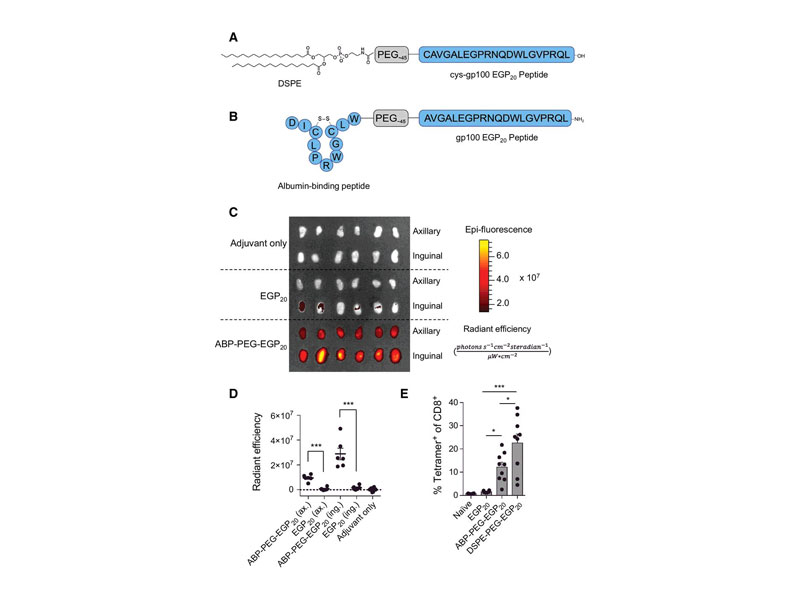
Enhancement of Peptide Vaccine Immunogenicity by Increasing Lymphatic Drainage and Boosting Serum Stability

Enhancement of Peptide Vaccine Immunogenicity by Increasing Lymphatic Drainage and Boosting Serum Stability
DOI: 10.1158/2326-6066.CIR-17-0607 Published September 2018
Kelly D. Moynihan, Rebecca L. Holden, Naveen K. Mehta, Chensu Wang, Mark R. Karver, Jens Dinter, Simon Liang, Wuhbet Abraham, Mariane B. Melo, Angela Q. Zhang, Na Li, Sylvie Le Gall, Bradley L. Pentelute and Darrell J. Irvine
Abstract
Antitumor T-cell responses have the potential to be curative in cancer patients, but the induction of potent T-cell immunity through vaccination remains a largely unmet goal of immunotherapy. We previously reported that the immunogenicity of peptide vaccines could be increased by maximizing delivery to lymph nodes (LNs), where T-cell responses are generated. This was achieved by conjugating the peptide to 1,2-distearoyl-sn-glycero-3-phosphoethanolamine-N-PEG (DSPE-PEG) to promote albumin binding, which resulted in enhanced lymphatic drainage and improved T-cell responses. Here, we expanded upon these findings and mechanistically dissected the properties that contribute to the potency of this amphiphile-vaccine (amph-vaccine). We found that multiple linkage chemistries could be used to link peptides with DSPE-PEG, and further, that multiple albumin-binding moieties conjugated to peptide antigens enhanced LN accumulation and subsequent T-cell priming. In addition to enhancing lymphatic trafficking, DSPE-PEG conjugation increased the stability of peptides in serum. DSPE-PEG peptides trafficked beyond immediate draining LNs to reach distal nodes, with antigen presented for at least a week in vivo, whereas soluble peptide presentation quickly decayed. Responses to amph-vaccines were not altered in mice deficient in the albumin-binding neonatal Fc receptor (FcRn), but required Batf3-dependent dendritic cells (DCs). Amph-peptides were processed by human DCs equivalently to unmodified peptides. These data define design criteria for enhancing the immunogenicity of molecular vaccines to guide the design of next-generation peptide vaccines. Cancer Immunol Res; 6(9); 1025–38. ©2018 AACR.



